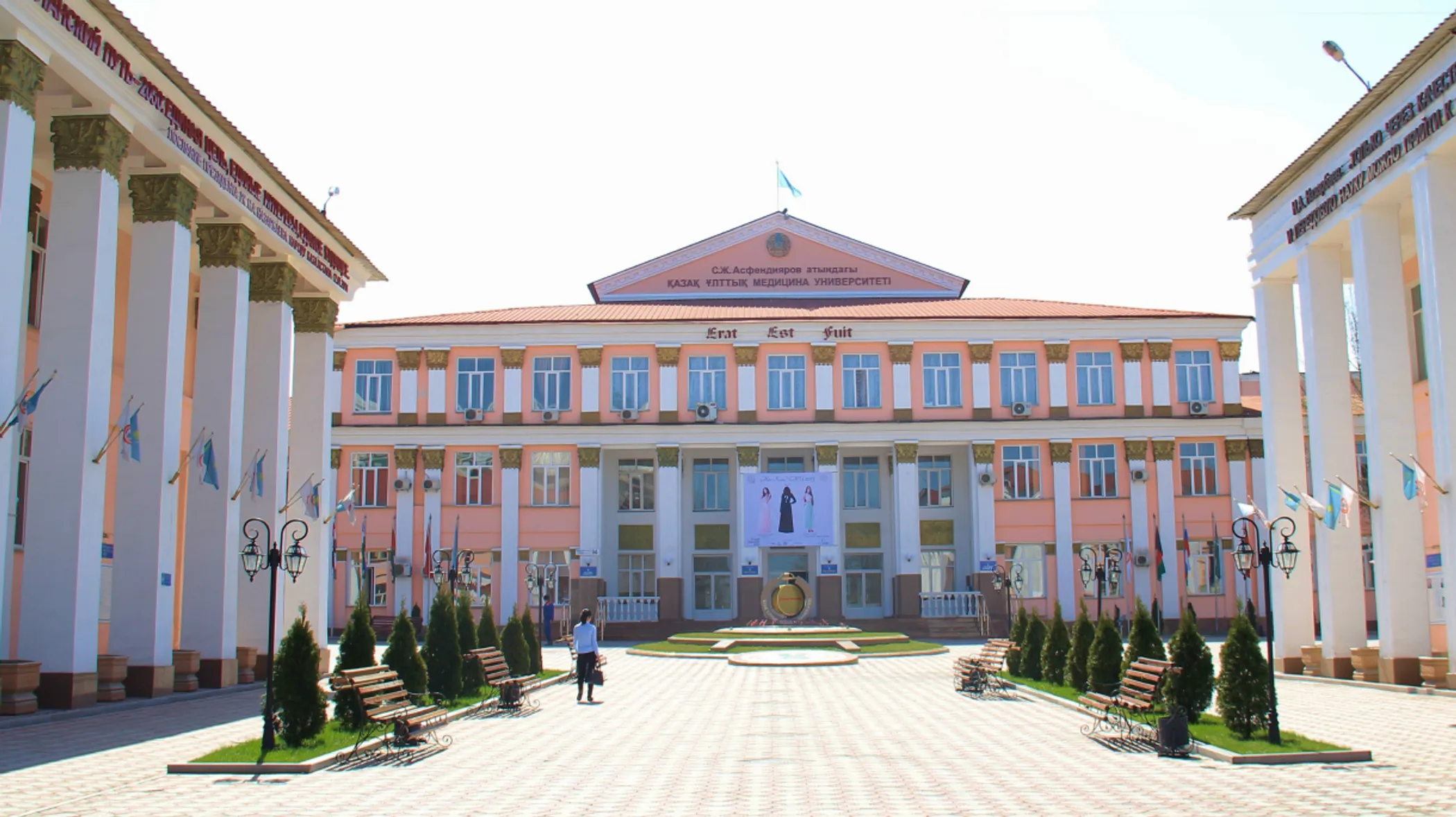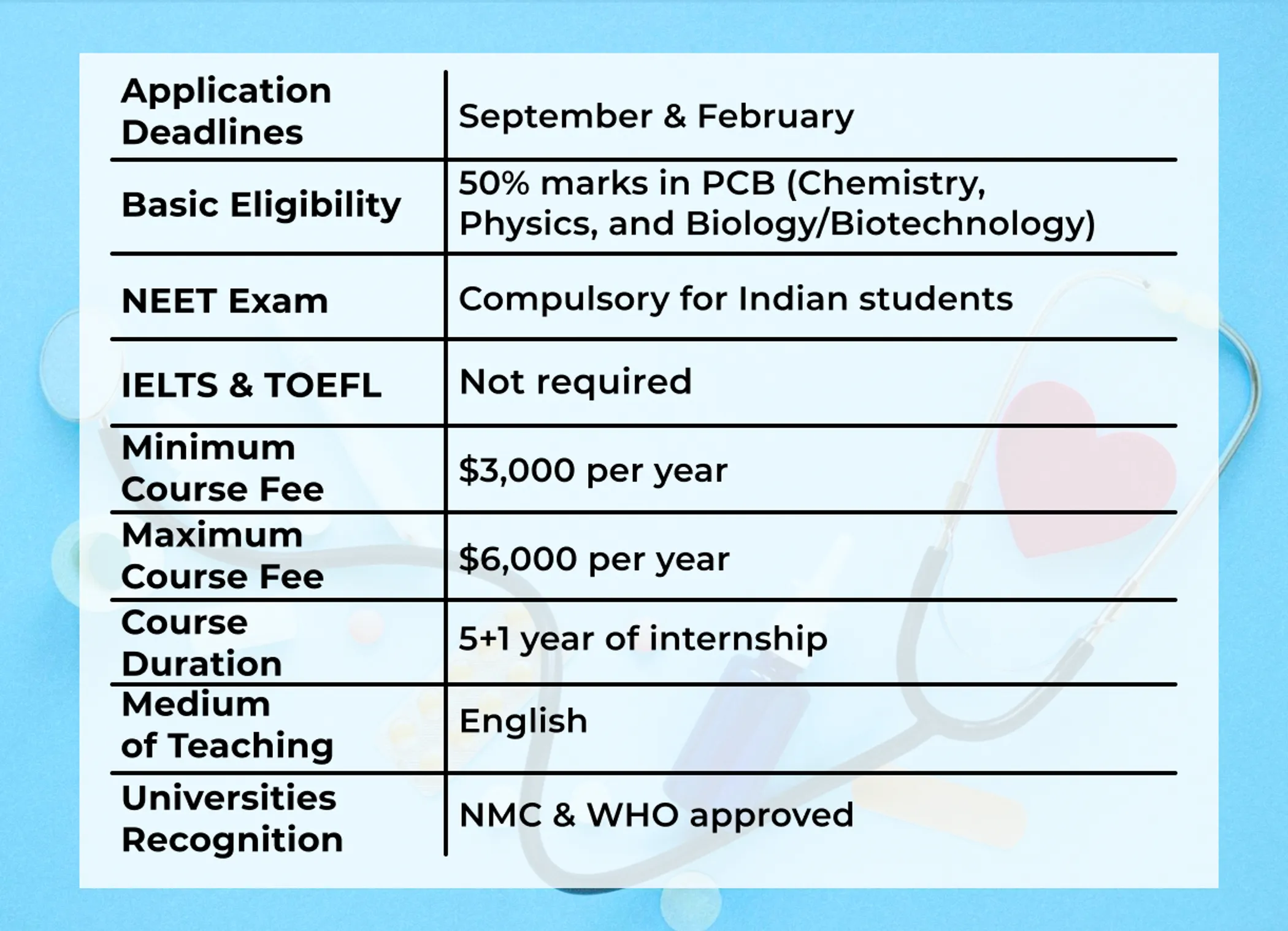Studying MBBS (Bachelor of Medicine and Bachelor of Surgery) in Kazakhstan has become a popular choice among foreign students seeking quality education at affordable rates. Kazakh medical universities are globally recognized by WHO, USMLE, IMED, GMC, and NMC, ensuring the validity and prestige of the obtained medical degree.
With lower tuition fees ranging from $3,000 to $5,000, a reduced cost of living, and a favorable student-teacher ratio of 10:1, Kazakhstan stands out as a great option for MBBS study abroad. In the 2022-2023 academic year, over 25,000 international students pursued their studies in the country.
The course duration typically spans 5 years, with an additional 1-year internship, and eligibility criteria include a minimum of 50% marks in PCB (Chemistry, Physics, and Biology/Biotechnology), along with mandatory NEET (National Eligibility cum Entrance Test) qualification for Indian students.
QazMonitor has compiled a guide covering essential information on MBBS studies in Kazakhstan, including benefits, universities, tuition fees, and admission requirements.
What are the benefits of studying MBBS in Kazakhstan?
Duration of MBBS Curriculum: The MBBS program in Kazakhstan spans five years, offering a more efficient timeline compared to many international programs that typically require six years of study. After completion, students have the option to return to their home country to pass licensing exams like FMGE and start practice, pursue postgraduate studies, or stay in Kazakhstan for medical practice.
English-medium Instruction: The courses are conducted entirely in English, eliminating the language barrier for foreign students.
Qualified Faculty: Professors in Kazakh universities are well-qualified, with years of teaching experience. They actively engage with students, providing practical insights into medical education throughout the degree program.
Robust Infrastructure: Medical colleges in Kazakhstan boast well-stocked laboratories accessible to students for personal studies, without additional charges.
Affordable Education: Most universities charge tuition fees below $5,000, making it a financially feasible option for international students.
No Entrance Test Required: Students seeking admission to MBBS in Kazakhstan do not need to clear entrance examinations such as IELTS and TOEFL. A minimum of 50% in Physics, Chemistry, and Biology in the 12th grade is sufficient.
Low Cost of Living: The monthly average living expense in Kazakhstan is between $500-600, making it a cost-effective option. This includes all overhead expenses and is highly dependent on the student's lifestyle.
Is an MBBS degree from Kazakhstan recognized internationally?
A medical degree from a Kazakh university is recognized upon successful completion of the Foreign Medical Graduate Examination (FMGE) administered by the National Medical Commission (NMC) post-graduation. This examination is mandatory for international medical graduates intending to practice in India. Moreover, Kazakh medical institutions hold accreditations from esteemed bodies including WHO, GMC, UNESCO, and NMC, ensuring the international acceptance and acknowledgment of their medical programs.
Which Kazakh universities offer MBBS programs?

Twelve medical institutions in Kazakhstan are approved by the National Medical Commission (NMC). Below, you will find information on some of these institutions, including their tuition fees and admission requirements.
Located in Almaty
Tuition: $4,190 per year
Accreditation: NMC & WHO Approved
Admission Requirements: Minimum 50% in PCB; NEET qualification (for Indian applicants)
Located in Almaty
Tuition: $6,600 per year
Accreditation: NMC & WHO Approved
Admission Requirements: Minimum 50% in PCB, NEET qualification (for Indian applicants)
Located in Astana
Tuition: $4,400 per year
Accreditation: NMC, WHO, & UNESCO Approved
Admission Requirements: Minimum 50% in PCB, NEET qualification (for Indian applicants)
Located in Almaty
Tuition: $3,900 per year
Accreditation: NMC & WHO Approved
Admission Requirements: Minimum 50% in PCB, NEET qualification (for Indian applicants)
Located in Semey
Tuition: $3,700 per year
Accreditation: NMC, WHO, & UNESCO Approved
Admission Requirements: Minimum 50% in PCB, NEET qualification (for Indian applicants)
Located in Shymkent
Tuition: $4,500 per year
Accreditation: NMC & WHO Approved
Admission Requirements: Minimum 50% in PCB, NEET qualification (for Indian applicants)
Located in Aktobe
Tuition: $3,500 per year
Accreditation: NMC & WHO Approved
Admission Requirements: Minimum 50% in PCB, NEET qualification (for Indian applicants)
Located in Karaganda
Tuition: $4,100 per year
Accreditation: NMC & WHO Approved
Admission Requirements: Minimum 50% in PCB, NEET qualification (for Indian applicants)

To recap, the full list of NMC-approved universities in Kazakhstan is as follows: Al-Farabi Kazakh National University, Asfendiyarov Kazakh National Medical University, Astana Medical University, International Medical School, Semey State Medical University, South Kazakhstan State Medical Academy, West Kazakhstan Marat Ospanov State Medical University, Karaganda Medical University Kokshetau State University, Kazakh Medical University of Continuing Education, Kazakh Russian Medical University, M. Kozybayev North Kazakhstan State University.
Is it easy for international students to adjust to life in Kazakhstan?
Adjusting to life in Kazakhstan, a central Asian country where Kazakh and Russian are the primary languages of communication, might initially present some challenges. However, the presence of English speakers and supportive associations helps make the transition smoother for international students. For instance, KAISA (Kazakh-Indian Students Association) functions as an informal network connecting around 700 Indian students across different Kazakh universities. This association promotes connections among Indian students and alumni, providing a platform for sharing information and addressing specific concerns.
Kazakhstan's international student community is diverse, numbering over 25,000 people. While many come from nearby countries like Uzbekistan and Kyrgyzstan, there is a growing number of students from India, Pakistan, and Bangladesh as well. This influx adds to the cultural richness of Kazakh universities, making them welcoming destinations for people from around the world.










